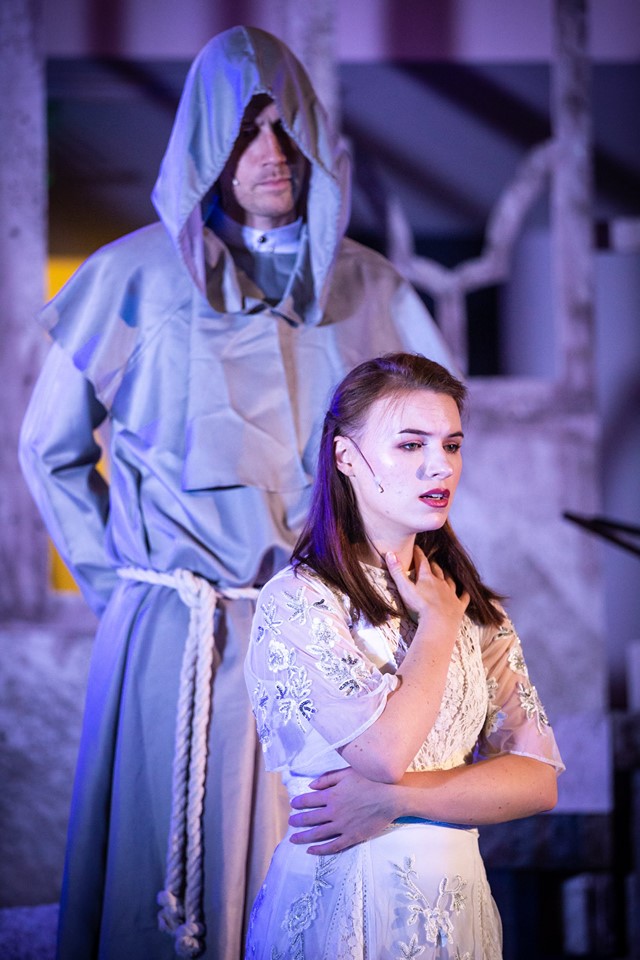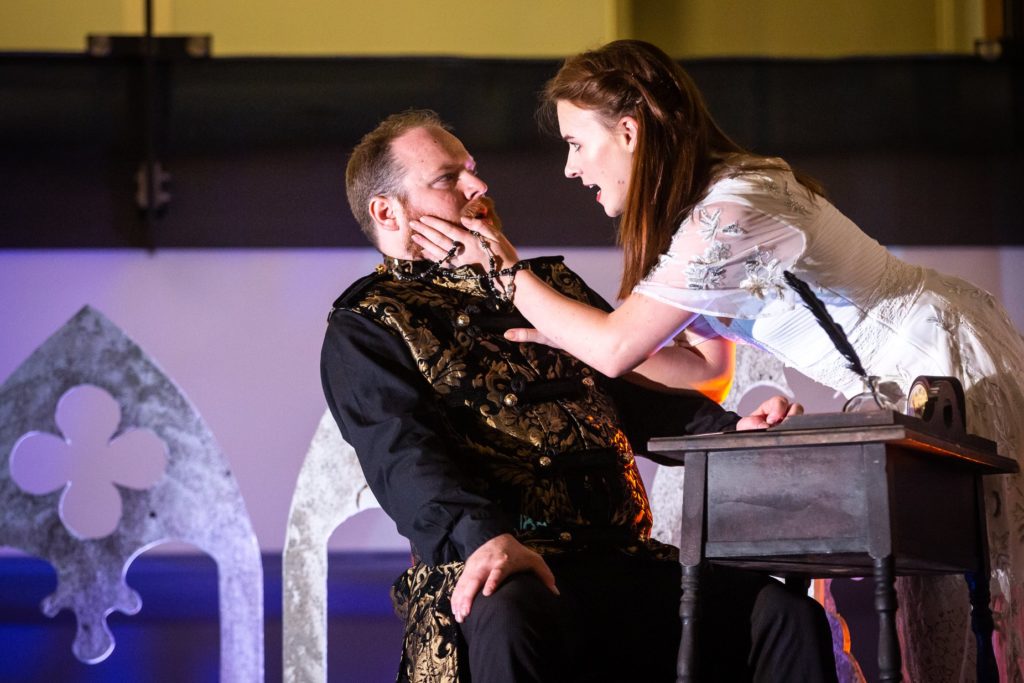
Photo via the BBT Facebook page.
Presented by Brown Box Theatre
Written by William Shakespeare
Directed by Kyler Taustin
Intimacy & Fight Choreography by Margaret Clark
Performances dates 8/21 – 8/25, 2019
Performance location (s): Various outdoor locations:
8/21: Sampus Pavilion, 160 Pawtucket Blvd, Lowell, MA
8/22: Borderland State Park, 250 Massapoaq Ave., Easton, MA
8/23: – Herter Park Ampitheater, 1175 Soldiers Field Road, Allston, MA
8/24: Hopkinton Ctr for the Arts, 98 Hayde Rowe Street, Hopkinton, MA
8/25: Atlantic Wharf/Waterfront Plaza, 290 Congress Street, Boston, MA
Brown Box on Facebook
Review by Chloé Cunha
(Boston, Mass.) Without even mentioning context, the above refrain strikes a familiar chord, the scene paints itself: a woman abused, her abuser, threatening the full extent of his power against her. Who will believe you? Chilling and pressing, Brown Box Theatre’s production reminds us why Shakespeare remains relevant today.
Measure for Measure, one of Shakespeare’s lesser known “problem” plays, is a morality tale that centers around Isabella (Sarah Boess), a woman determined to save her brother Claudio (Drew Cleveland), condemned to death by a brutally pious government, without compromising herself. The play begins with the Duke of Vienna (Chris Kandra), who, frustrated by his own lax enforcement of his city’s puritanical laws, decides to leave his pharisaic deputy Angelo (Spencer Parli Tew) in charge while he pretends to leave town. The plan is simple: as the Duke watches on in disguise, Angelo does his dirty work and the Duke can thus avoid being labeled a hypocrite.
The company was solid all around, showing an admirable focus even while the occasional technical snafu (wind interference, mic troubles) or outside distraction threatened to disrupt the show– you can turn off a ringing phone, but try shushing a car radio!
There were definitely a few notable standout performances. Norton as the comic relief seemed to find real joy and ease in the tricky wordplay. Parli Tew was appropriately menacing, reminiscent at times of a more subdued Frollo from The Hunchback of Notre Dame. Finally Boess was thrilling to watch, giving enormous emotional range to Isabella.

Photo via the BBT Facebook page.
The outdoor aspect of the performance was more positive than negative, and succeeded in its goal of keeping the performance accessible to an audience who may not ordinarily think to go see Shakespeare, or be able to afford the average theater ticket. Curious onlookers would pause to look at a scene, and the lawn at my performance was quite full and rapt. It should be noted Shakespeare’s bawdy humor didn’t always age well, but the drama seemed to resonate with the crowd.
The set is beautiful and versatile. It lends itself to creating compelling tableaux on stage through creative blocking. Resembling the interior of a Gothic cathedral, the set twists up into a spiral staircase with a tower in the middle. It allows for a captivating visual interplay of power dynamics as characters literally loom over others depending on their status in the scene.
A particularly symbolic moment occurs in the finale, as the Duke stands tall above everyone else in the center tower, all other characters placed more or less according to their level of influence. Isabella, for all her efforts and moral clarity, is at the bottom.
In the end, the Duke seems to have a change of heart about his initial call for propriety. The play ends with all the women neatly married off. The chips fall into place as the upended power structure reconfigures itself into a tidy, domestic bow, the promise of the nuclear family restored. Both the Duke and Isabella wear white: a foreshadowing of his “proposal” to her. Isabella doesn’t say yes or no. The staging is telling; her back is turned to the audience, shoulders slumped.
I was able to speak briefly to director Kyler Taustin, and he said how deeply he wanted to highlight “the effects of what happened throughout the play, how heavily they weighed on the women and especially the character of Isabella.” With that in mind, Taustin gives Isabella the final word in a way. She has no additional written lines before the final curtain. She turns to face the audience. Her breath his heavy and loud, shuddering… then, darkness.
